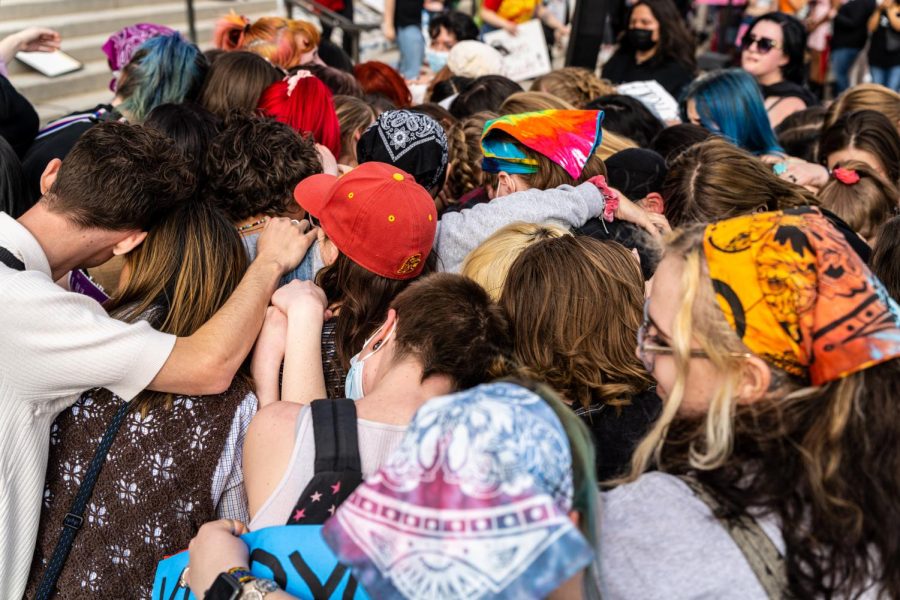Bringhurst: Supporting Salt Lake Communities Post Roe v. Wade
The crowd of demonstrators embrace while protesting the potential overturn against Roe v. Wade at the Utah State Capitol on May 5, 2022. (Photo by Xiangyao “Axe” Tang | The Daily Utah Chronicle)
May 23, 2022
Americans stare into an uncertain future after the leaked Supreme Court draft opinion revealed intentions to overturn Roe v. Wade. Utah and other red states have passed trigger laws to make abortion illegal as soon as its federal protections end.
With abortion rights in danger, we have the opportunity to take preemptive action. We should start by protecting our immediate communities and showing solidarity with increasingly vulnerable groups.
Where Do We Go from Here?
Sixty-one percent of Americans believe abortion should be legal in all or most cases. I am hopeful that Congress will eventually protect abortion on a federal level, but that may take a while. Protesting and writing to legislators can change politics in the long term, but we cannot abandon our neighbors who need immediate help.
The COVID-19 pandemic reinforced the meaning of solidarity. Mutual aid networks boomed in membership, including Salt Lake Community Mutual Aid. The group provides groceries, supplies and direct cash support to those in need and garnered more than 140 volunteers within the first month of the pandemic. While politicians left the needs of their constituents unaddressed, communities banded together for support.
“People feel powerless,” said Cameron Campbell, a member of SLCMA. “One of the things that’s been particularly helpful, at least for me, is that line of community.” Though SLCMA was established specifically for COVID-19 relief, it grew to become a broader source of support. And now, SLCMA works to provide relief in a post-Roe world.
If Roe is overturned, members of our community will once again be in dire circumstances, with little help outside of mutual aid and crowdfunding. As we use existing structures to provide support, we should focus efforts on mobilizing aid for vulnerable groups.
Helping Marginalized Communities
Within our neighborhoods, some communities are more vulnerable than others. Sixty-five percent of Utahns who had abortions in 2019 said they did so for socioeconomic reasons. Less affluent communities and those with limited access to healthcare are more likely to seek out an abortion. And because of economic racial disparities in the U.S., people of color have a higher risk of unwanted pregnancy.
In 2019, Black women had the highest rate of abortions and Hispanic women had the second-highest rate. White women had the lowest. This can be attributed to a lack of access to quality healthcare for people of color. Black and Hispanic women are also more likely to experience severe complications during childbirth. Overturning Roe will allow judges and legislators to demonstrate their lack of sympathy towards minority communities.
Banning abortion also restricts access to reproductive healthcare on a larger scale, putting queer communities at increased risk. Several states already restrict gender-affirming healthcare, and facilities that provide medical services to trans people could shut down. In addition, transgender adults are more likely to be uninsured and live in poverty than cisgender people, making them more vulnerable to unwanted pregnancies.
Hindering reproductive rights directly hinders LGBTQ+ rights. Considering the impending consequences of restricting reproductive rights, strong mutual aid networks are vital to sustaining marginalized communities.
How to Help in Salt Lake Valley
If the Supreme Court overturns Roe, women’s health centers will need funding to continue offering contraceptives and STD testing. Utah Abortion Fund takes donations and volunteers. Beyond monetary donations, UTAF will also need help with delivering resources, driving people to appointments, fundraising and guidance counseling.
SLCMA will work with UTAF to organize relief for those with unwanted pregnancies. “While we’re more than happy to do what we can with the number of people we have, if we can have even more, then we’ll be able to do more,” Campbell said. “Especially because in this context, doing more has the very real potential to save more lives.”
Planned Parenthood and the Wasatch Women’s Center are the only two abortion clinics in Utah, and both could use monetary donations. Planned Parenthood has initiatives to protect reproductive rights, but they also have more funds and resources than local businesses like the Wasatch Women’s Center.
If the Supreme Court overturns Roe v. Wade, Utah will make most abortions illegal, putting thousands of women in danger. People of color and the LGBTQ+ community require our immediate support. While we can’t do much to change policy on an individual level, the structure for community aid already exists. All we have to do is contribute to it.
Donate if you can or reach out to groups in need of volunteer work. When institutions fall short, community can be a source of consolation.









- • May 27, 2022 at 8:13 am
I am curious why you believe that LGBTQ+ are specifically tied to reproductive rights. Would you be willing to expound?
Maggie Bringhurst • Jun 1, 2022 at 2:48 pm
Hi, thanks for asking! The Supreme Court draft opinion’s logic for overturning Roe v Wade could also apply to LGBTQ+ rights. The Supreme Court’s draft opinion states abortion isn’t mentioned in the constitution, questioning the right to privacy, and thus anti-sodomy laws such as marriage equality. It also threatens the right to gender-affirming healthcare and bodily autonomy for trans people. While all genders are influenced by harmful reproductive laws, trans men and non-binary people are at greater risk of not receiving safe, gender-affirming reproductive healthcare. Many abortion clinics also provide gender-affirming healthcare, so shutting down these clinics will restrict the LGBTQ+ community’s access to safe, inclusive health care.
Here are a couple articles that explain the issue in a comprehensive way:
https://thehill.com/news/state-watch/3479755-how-roe-v-wades-reversal-could-effect-the-lgbt-community/
https://abcnews.go.com/US/push-inclusion-abortion-rights-movement/story?id=84542537
- • Jul 11, 2022 at 1:56 pm
Thank you.